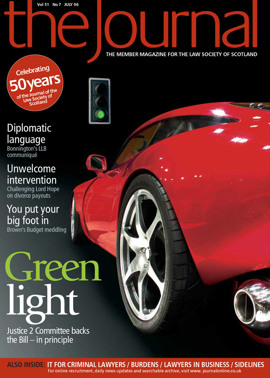Revving up for debate

The Scottish Parliament’s Justice 2 Committee has backed the general principles of the Legal Profession and Legal Aid (Scotland) Bill, but with a lengthy list of action points for the Executive before the bill is debated in the parliament.
In its report, published on 30 June, the committee expresses its concerns over the lack of detailed information as to how the proposed Scottish Legal Services Complaints Commission would operate in practice, and as to the costs and financial accountability of the Commission.
The committee, designated by the Parliament as lead committee on the bill with the duty to report on its general principles, held five oral evidence sessions and received over 630 written submissions – more than 550 of which were from individual lawyers and legal organisations.
At first sight the report does not give much away, largely summarising the main evidence on each issue, then stating the committee’s conclusion – generally without elaborating its reasoning. The committee does however set out its priorities for the handling of complaints: “independence (including the perception of independence from both the government and legal profession), confidence of members of the public, complainants and the legal profession, and that it is fair, speedy, simple, transparent and cost-effective” (para 64). It would be fair to say that its conclusions and recommendations reflect these views.
Mixed success
The Law Society of Scotland, which responded by restating its support for the principle of an independent body to handle service complaints, had six key objections to the bill as published. Predictably, it has had mixed success in persuading the committee to accept its views.
The two most important matters for the Society were the ECHR compatibility issues and the distinction between conduct and service matters, the Society seeking to retain exclusive jurisdiction to investigate professional conduct complaints.
Readers may recall that the Society’s advice from Lord Lester QC, that the bill conflicts with article 6(1) ECHR due to the manner of appointment of its members, combined with the lack of appeal to a judicial body, was met by a rather bald assertion from the Executive that the Commission would be EHCR-compliant. The committee wants to hear from the Executive, before the stage 1 debate in early September, its response to various suggestions to get round the perceived ECHR issues (more independent method of appointment; an appeal tribunal; and separation of adjudication and complaints-handling functions, as with the Financial Ombudsman Service).
As for conduct cases, the committee was under some pressure from consumer groups and others for the Commission to deal directly with conduct as well as service issues – a topic certain to be raised in parliamentary debate. On this point the committee poses the question whether having a dual system that leaves conduct with the professional bodies would meet its priorities for a complaints handling system, and in principle (with a dissenting voice in SSP member Colin Fox) concludes that it would. However it clearly has concerns over the potential for practical difficulties to arise, and asks the Executive “to set out clearly how the distinction between conduct and services complaints can be applied in practice in order to achieve the objective of the bill to build public confidence in the complaints handling process”. It also believes that the bill should itself prescribe how to resolve any disagreement between the Commission and the professional bodies over how a complaint should be handled.
The dreaded levy
The point on which the committee does fall foursquare behind the profession is the “solicitor pays regardless” complaints levy. Most of its witnesses regarded this as unfair and/or open to abuse (even Scotland Against Crooked Lawyers), and the committee believes that the bill should be amended so that the levy is payable only where a complaint is upheld. (Liberal Democrat Jeremy Purvis dissented on the basis that the bill should not be prescriptive on this.) Although Mr Henry, the Deputy Justice Minister, expressed the view in evidence that the levy could be set at zero in such cases, the committee had difficulty reconciling this with section 19 of the bill.
The £20,000 compensation limit, which attracted almost as many complaints from the profession, was supported in evidence by consumer groups and the report is non-committal on this. It does however consider that there is “no clear rationale” for the figure selected and calls on the Executive to clarify this before stage 2.
Negligence and PII
The committee comes down against the Society’s view on negligence cases, taking the view that “the Commission will provide a more open system for the consumer to pursue negligence claims”. It does accept that the test, and standards, for negligence should be the same as those applied by the courts, and calls on the Executive to confirm this; and is “sympathetic” to the proposal that the Commission identify separately the compensation awarded “for negligence and for loss, distress or inconvenience arising from IPS”. This reflects evidence from Master Policy insurers that they would otherwise be unable to decide to what extent an award should be set off against any payment under the policy.
The Society’s final concern was the Commission’s proposed supervisory remit over the Master Policy and Guarantee Fund. Again there was a sharp division between the evidence from the profession and from consumer interests, and again the committee comes down on the side of boosting consumer confidence. It does however note that the Commission is only given a power of recommendation, “and seeks clarification from the Executive as to what will happen in the event that the professional bodies and insurers disagree with or refuse to implement a Commission recommendation”.
Society: committee did its job
Commenting on the report, the other main conclusions of which appear in the panels, Douglas Mill, the Society’s Chief Executive said that the committee was ensuring that the Scottish Executive made the bill workable, cost-effective and fair.
“The Committee had a difficult job to do with a bill that had many gaps and guesstimates in it. They have been careful to look for a balance of the evidence before them and seek answers to the questions that an increasing number of people are looking for from the Scottish Executive.”
He hoped the Executive would now adopt the committee’s position that solicitors should not be expected to pay a case levy when exonerated of wrongdoing.
Emphasising the Society’s continued willingness to work with the Executive and the committee to resolve the issues raised, Mill added: “The Society has highlighted its concerns now to both the Scottish Executive and the Justice 2 Committee. The flaws must be addressed if the bill is to work and that is the fundamental issue in all of this.”
The committee also agrees:
- with a wide definition of potential complainants, while asking the Executive to report further on how to address issues arising from third party complaints;
- with the concept of an annual levy, provided robust accountability controls are in place;
- with the proposed composition of the Commission, and supports limits being placed on the Executive’s power to vary this;
- that ss 25-29 of the Law Reform (Miscellaneous Provisions) (Scotland) Act 1990 (rights of audience for members of other professional bodies) should be brought into force by March 2007;
- that the Scottish Legal Aid Board should take over granting legal aid in solemn criminal cases;
- that it would be disproportionate to make non-lawyer advisers subject to the new Commission, but effective complaints and quality standards systems should be in place for them;
- that the bill should be amended to allow grant funding of non-legally qualified advisers.
The committee also wants:
- an assurance that mediation and complaints handling in the Commission will be kept separate;
- further dialogue between the minister and the professional indemnity insurers to resolve issues of uncertainty, and a report back prior to stage 2;
- more information on the rationale behind the £5,000 limit on compensation awardable by the Discipline Tribunal for loss following on misconduct, before stage 2;
- an assurance that any access to justice issues will be monitored by the Executive and addressed;
- the Executive to comment on whether people with rights of audience/mediators should come under the new advice and assistance provisions, beforestage 2;
- the Executive to report back on how exclusions from the bill (including financial services constituting exempt related activities – the endowment issue) are to be handled, before stage 2.
In this issue
- Challenging times
- A block on service
- Revving up for debate
- LLB confidential
- Clean break under attack
- The hokey-cokey Chancellor
- Switching channels
- The Chancellor gets it REIT
- Executries sponsored feature
- The EU and the criminal
- Case for the defence
- To act or not to act... that is the question!
- A summary matter
- Ireland 4, Italy 0
- The route ahead
- Scottish Solicitors Discipline Tribunal
- Website reviews
- Book reviews
- Is that burden dead yet?






